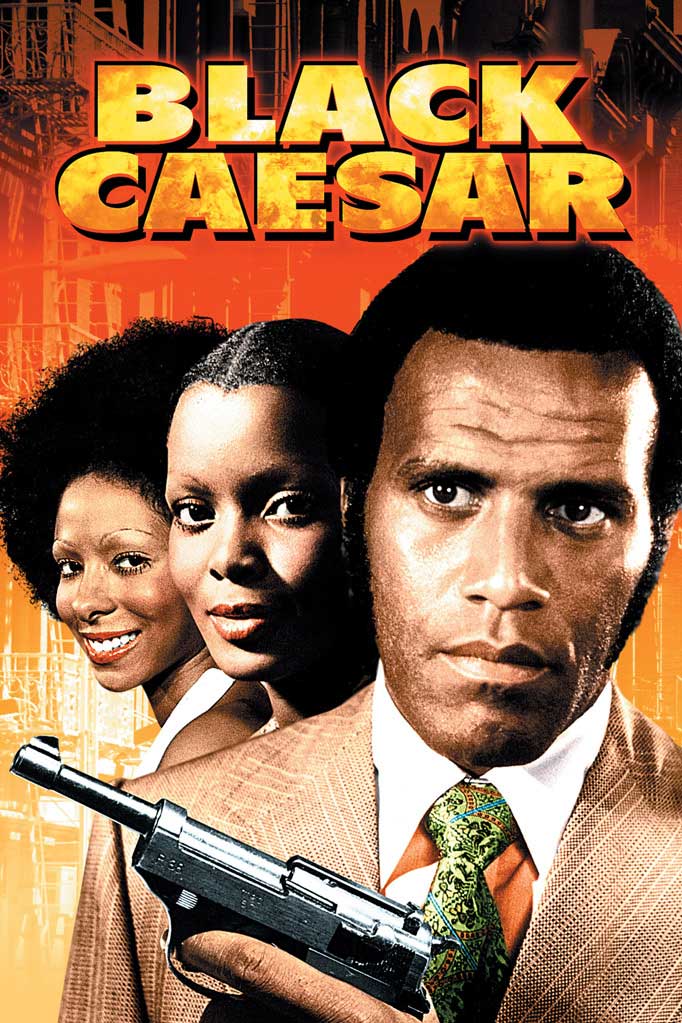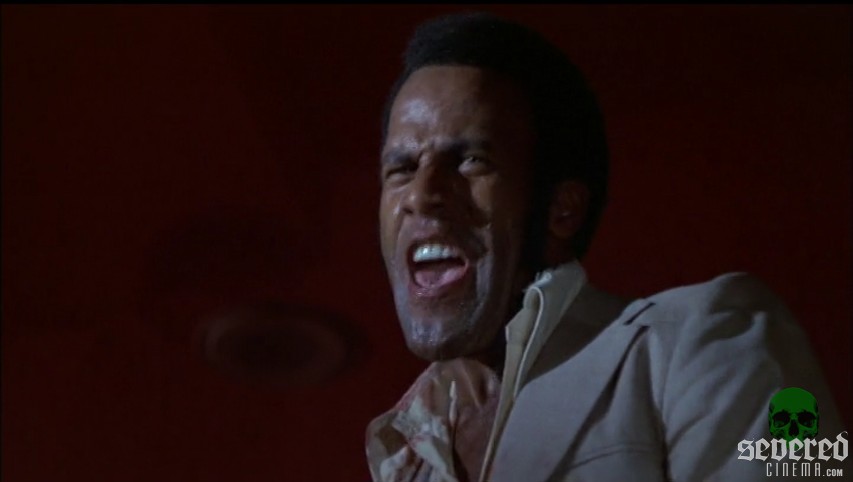Black Caesar DVD Review from MGM!
On Severed Cinema we try to cover a wide variety of genres. However, aside from oddities such as Dr. Black & Mr. Hyde, and in a way The Thing with Two Heads, so called Blaxploitation Cinema is neglected. Shamefully because the category has so many topics such as horror, action, comedy, westerns and thrillers. So much falls under the heading in such a short period of time when a huge splash of movies made stars the likes of Fred Williamson, Jim Brown, Pam Grier, Max Julien and shared time with names such as Rudy Ray Moore, Richard Prior and Isaac Hayes.
Blaxploitation made money yet are simply films wherein the central cast are black, and casual or strong racism is thrown into the mix. Racist cops, politicians, sheriffs, lawyers, whores, a majority of whites are like a dinner party between the UKIP and the KKK.
I’m a huge collector of ‘70s ‘black’ films (well, a lot of ‘70s films truth be told), and I feel it’s time to address the balance here on Severed Cinema. Behold, one of the originators of Blaxploitation which is written and directed by Larry (The Stuff, Q: The Winged Serpent) Cohen, a man whom put his hand to many things and made them golden. Starring Exploitation workhorse, Fred (From Dusk Till Dawn, Hammer, Bronx Warriors) Williamson at a time his star was truly beginning to rise and captures the obvious public wanting for rough and tumble gangster flicks.
Black Caesar begins in the ‘50s and the teenagehood of Tommy Gibbs, our main guy. He’s seen as a shoe shine boy, but it’s all just a ploy to have a man hit in the street. Tommy is a runner. He spends his time helping and doing deliveries for the gangs. As the marvellous James Brown soundtrack throws us Down and Out in New York City, Tommy is running and meeting suited men. One day he delivers a payoff to McKinney who is an on-beat cop in the precinct. “Remember, nigger, you’ve never seen me! I’ll cut your black balls off!” McKinney snarls on the stairs in his tenement building. He then decides the money is short by fifty dollars so he begins to frisk Tommy. Next thing we know he’s brutally beating the lad down to the floor.
The years pass. Tommy has grown up to be a tall smoothly dressed dude with huge lamb chop sideburns. He’s stayed with the street life, rising through the ranks and has decided to plunge head first into a make or break deal with the local Italian hoods. To do this, he kills a man with a contract on his head in the barbers. Cutting the dead man’s ear off, he heads to a restaurant and plops it onto the plate of mob boss, Cardoza. “Thought your sauce needed more meat.” he grins. Cardoza slowly calms down after hearing what Tommy has done. He’s invited to sit at the table, and the boss cracks a few racist jokes just for the hell of it. Tommy explains how, since the Cardoza are known not to like or employ blacks, Tommy and his men could carry out untraceable hits. All he wants is control of blocks in Harlem. “Whaddaya want with dat? It’s a shithole!” Cardoza blurts. Tommy nods, “I’ll make it work.”
Thus, Tommy and his friends run the streets. The hookers, the numbers, all of it. They do the hits as instructed and look slick for the James Brown music. They discuss with a lawyer, Coleman, about running the money through to invest the properties and, as Tommy’s childhood pal, Joe ‘The Brain’ states, it must be used to put something back into their community. This causes Tommy to slyly grin. He leans over the lawyer; “Have you heard of a bag man called Grossfield?” It transpires that there’s a ledger filled with the names of people on the take since the days of Tommy running as a kid. In fact, he saw these ledgers and recalls how powerful they would be in the right hands. Every now and then, Grossfield has to take them from his safety deposit box and have them checked over. The time is soon. Coleman agrees to ‘represent’ them and their ‘interests’ once the ledgers are in Tommy’s hands.
On the chosen night, at an empty club, Tommy’s girl, Helen is unknowingly roped into proceedings as he tells her to sing and play loud. When she hears the gunshots her face reveals the terror she feels when faced by her man.
Putting everyone on the payroll and inviting them for a discussion, whilst the ledgers are on the desk for them to see is the next step in the plan. One such person is McKinney, who has risen high in the police ranks and as they both lock eyes, the sheer hatred can be felt by all in the room. “Right now you’re as high as a junkie with a hundred dollar habit,” McKinney sneers, “but everyone crashes!”
In a surprise move, Tommy buys his lawyer’s apartment, including all belongings for a healthy price. Coleman is stunned but accepts. “I grew up with your leftovers.” Tommy waxes lyrical to his ‘friend’. The next morning, their maid, Abbey, arrives. She’s Tommy’s mother! “You been takin’ dope?” she snaps, “I ain’t workin’ fo’ you! You an ungrateful bum!” However, he’s bought it for her, but she sobs. “I wouldn’t know what to do, I am a maid, Tommy!”
Tommy sits down with Cardoza in the restaurant and laughs off the boss’s racist jibes, whilst his men swamp Cardoza’s gunmen from the roof. Their new agreement is that Tommy will be the man, whilst Cardoza will be the token ‘white face’ for everyone else. Cardoza threatens him with his brothers. Tommy smiles. “You know, I fancy a trip to California.” Next stop is the Cardoza villa in California and they slaughter every Sicilian on the premises with some rather over-the-top ‘70s gunshot wriggle deaths lobbed in for a chuckle. Tommy has everything now!
“I guarantee it, you’re one dead coon by the end of the week.” states McKinney just before Tommy meets up with the last of the head guys in his area. Tommy promises them he’ll leave the narcotic business alone, and their pays won’t change. “Things will be quiet in the ghetto.” he says.
He’s a street celebrity now. People chant for him. However, all highs do crash down. In Tommy’s case it begins slowly. Helen is still distant to him. His power mad ego causes him to rape her. “So this is the way you like it?”
Then his Pops appears in his life raising memories of hardships. As they walk around the derelict projects he grew up in, Tommy snarls. “Didn’t it occur to you I might have waited twenty five years jus’ to kill you??!” He does let him go. “I don’t ever want to see you again!”
Learning there may be a retaliation coming his way, Tommy decides to hire some extra Detroit muscle and send Helen away with Joe, but then Momma dies, totally shattering his world. He becomes paranoid and his rage is directed towards Helen and Joe.
Two years pass by, McKinney and Coleman get together to plan Tommy’s downfall. One by one, Tommy’s men are massacred. McKinney uses Helen to get close to his nemesis. He wants those ledgers! As his life spirals out of control, Tommy finds himself trying to tie up all the loose ends whilst holding his bleeding stomach after receiving a gut shot in the busy streets. The loose ends include car chases, double crosses and violent deaths. It all concludes with a sorrowful and jaw dropping scene. (When I first watched Black Caesar on VHS with a close friend, years ago, he dropped his beer bottle in shock. Years later, my Horror Soulmate just stared at the screen in stunned silence).
Ironically enough, the ending was apparently released accidentally. It was all meant to end about three minutes earlier and did upon its original theatrical showing (leading on smoothly into its sequel, Hell Up in Harlem… which isn’t fit to shine the shoes of Black Caesar, aside from the fact Tommy’s Pops has a marvellous role in it) but the European tapes somehow brought with them this far better conclusion.
The James Brown soundtrack is simply one of the best of its era. It is on a par with Curtis Mayfield’s Superfly and Isaac Hayes’ Shaft (to me the only good thing in both films is the music), and along with Trouble Man, Sweet Sweetback’s Baadasssss Song, The Mack and maybe Truck Turner, Black Caesar is a complete package.
In Black Caesar‘s world, every white face is a backstabbing racist. There’s more use of “Nigger” “Coon” and “Black bastard” than a gathering in Alabama where the second coming of Jesus himself comes out wearing a KKK hood!
What else can I say? Well, the film is a classic, however the MGM release on DVD is confusing. Returning to the situation with the ending, Stable Cane’s big box tape included a verbal exchange between Tommy and the gang of street kids. MGM’s just has James Brown playing as the scene plays out. Weird when you can see their lips moving. Also on Stable Cane’s, JB’s theme bangs out far more dramatically. As the last date displays on the screen, we have a huge: “Down and out…!!” wherein now it’s a later segment of music instead. It is very hard to explain in words, it just has to be heard to get what I mean. MGM decided just to slap the trailer on as an extra but they aren’t known for daubing their DVDs with earth shattering extras are they?
AKA: The Godfather of Harlem, Street Kill, Black Max, O chefao de New York
Directed by: Larry Cohen | Written by: Larry Cohen | Produced by: Larry Cohen, James Dixon, Peter Sabaston, Janelle Cohen | Cinematography by: Fenton Hamilton | Editing by: George Folsey Jr | Music by: James Brown | Special Effects by: Rick Baker | Cast: Fred Williamson, Gloria Hendry, Art Lund, Val Avery, Minnie Gentry, Philip Roye | Year: 1973 | Country: USA | Language: English | Color: Color | Runtime: 1h 30min
Distributor: MGM
DVD SPECS:
Aspect Ratio: 1.85:1 16:9
Region: NTSC R1
Audio: Dolby Digital Stereo
SUPPLEMENTAL MATERIAL:
– Theatrical Trailer





























